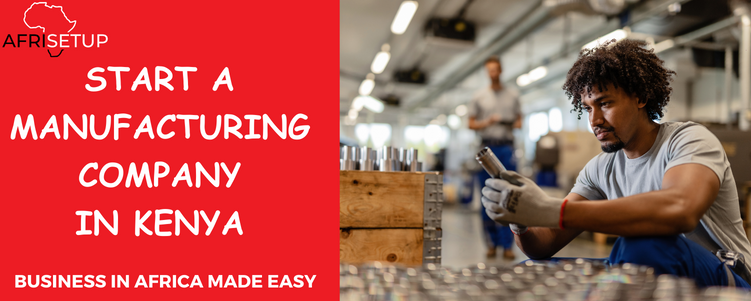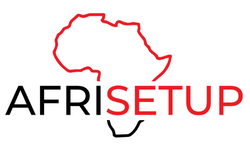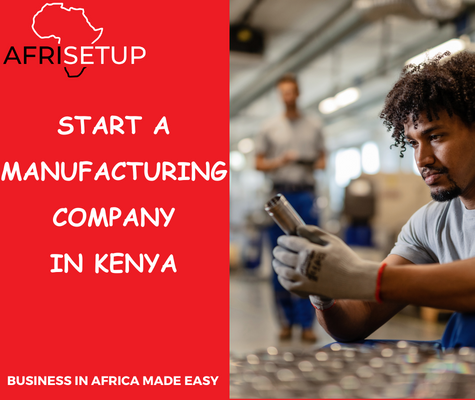- By afrisetupconsultants
- Uncategorized
- 0 Comment

Start a manufacturing company in Kenya – In this guide, we will delve into the essential steps and considerations for establishing a manufacturing company in Kenya. This includes the regulatory environment, key industries, advantages, and the overall business landscape. Whether you are planning to venture into food processing, textiles, construction materials, or any other manufacturing sector, Kenya presents a range of opportunities for growth and success.
Are you looking to start a manufacturing company in Kenya? Look no further! We specialize in assisting business owners like you register businesses in Kenya with ease. Our expert team is well-versed in the local regulations and can guide you through the process seamlessly.
Why Choose Us for guidance on how to Start a manufacturing company in Kenya
- Experience: With over a decade of experience, we have been helping business owners establish their presence in Kenya successfully.
- Expertise: Our team understands the nuances of company registration in Kenya and can provide tailored solutions to meet your specific needs.
- Efficiency: Save time and effort by entrusting us with the intricate process of company registration, allowing you to focus on your business operations.
Get in touch with us today and let us pave the way for your manufacturing venture in Kenya!
Before discussing some manufacturing business ideas in Kenya, it’s important to know about the top manufacturing companies in the country when looking to start a manufacturing company in Kenya so that you can learn one or two things from them.
Manufacturing companies in Kenya | List of Manufacturing companies in Kenya
Here is a list of some of the top manufacturing companies in Kenya:
- Unilever: Unilever is a multinational consumer goods company with a rich history dating back to the 19th century. Founded in 1929 through a merger of Lever Brothers and Margarine. Unilever has evolved into one of the world’s leading producers of everyday products, including food, beverages, cleaning agents, and personal care items.
- East African Breweries; A leading beverage manufacturing company in East Africa, with its headquarters in Nairobi, Kenya. Established in 1922, EABL has grown to become a prominent player in the alcoholic and non-alcoholic beverage industry, offering a diverse range of products including beer, spirits, and non-alcoholic beverages.
- Kapa Oil refineries limited; Kapa Oil Refineries Limited is a leading manufacturer and supplier of edible oils, fats, and hygiene products in Kenya. Established in 2005, Kapa Oil has rapidly grown to become a significant player in the East African region, offering a wide range of quality products for both domestic and commercial use.
- Bamburi Cement Bamburi: Cement is a leading cement manufacturing company in Kenya and part of the Lafarge Holcim Group, a global leader in building materials and solutions. With a history spanning over six decades, Bamburi Cement has played a pivotal role in the construction industry, providing high-quality cement products for various infrastructure and building projects in Kenya and the East African region.
- Bidco; Bidco Africa Limited is one of the largest consumer goods companies in East Africa, with its headquarters in Thika, Kenya
Small manufacturing business ideas in Kenya:
At Afrisetup, we’ve gathered a few manufacturing ideas for you to think about if you’re considering to start a manufacturing company in Kenya:
- Beverage Production: With the growing demand for beverages such as fruit juices, soft drinks, and bottled water, setting up a small-scale beverage production unit could be a promising venture.
- Value-Added Agro-Processing: Kenya’s agricultural sector provides opportunities for small-scale agro-processing businesses such as fruit and vegetable processing, grain milling, and dairy processing.
- Personal Care Product Manufacturing: Manufacturing products such as soaps, shampoos, and lotions using locally sourced natural ingredients can cater to the increasing demand for personal care items in the market.
- Paper and Stationery Production: Establishing a small-scale paper and stationery manufacturing unit to produce items like exercise books, envelopes, and paper bags could be a viable business idea.
- Metal Fabrication and Welding: There is a demand for metal fabrication services for gates, grills, and other metal structures. Setting up a small metal fabrication workshop can cater to this demand.
- Carpentry and Furniture Manufacturing: With a growing real estate sector, the demand for quality furniture is on the rise, making small-scale furniture manufacturing a lucrative business opportunity.
- Garment and Textile Production: Starting a small garment and textile manufacturing unit to produce clothing and fabric products for the local market can be a profitable venture.
Manufacturing Laws in Kenya
Before starting a manufacturing company in Kenya, it is important to familiarize yourself with some of the manufacturing laws in Kenya so that you can run your company smoothly. Here are some of the manufacturing Laws in Kenya:
- Kenya has established an accreditation body called the Kenya Bureau of Standards (KEBS), with the aim of developing a national accreditation system to ensure the competence of testing and calibration processes. This further underscores the country’s focus on quality assurance and compliance within the manufacturing sector.
- Taxation: Manufacturers are subject to various taxes, including corporate income tax, value-added tax (VAT), excise duty, and customs duties on imported raw materials and machinery. There are tax incentives and exemptions available for certain types of manufacturing activities to promote investment and economic development.
- Intellectual Property Rights: Intellectual property laws protect innovations, inventions, trademarks, and other intellectual property assets created by manufacturers. Businesses may need to register trademarks, patents, or copyrights to protect their intellectual property rights and prevent unauthorized use or infringement.
- Quality Standards: Compliance with quality standards and regulations is important for ensuring the safety, reliability, and quality of manufactured products. Manufacturers may need to adhere to national or international quality standards relevant to their industry or products.
Requirements to start a Manufacturing Company in Kenya
Here are some of the requirements needed to start a manufacturing company in Kenya:
- Company Registration in Kenya: The initial step involves acquiring a certificate of incorporation or registration from the Registrar of Companies to formally establish the manufacturing company.
- Product Certification and Inspection: All products undergo scrutiny and qualification procedures conducted by KEBS to ensure conformity with standards. Products are categorized into segments such as food, chemicals, and machinery, each subjected to a certification process.
- Application and Testing: Procure the application form from KEBS offices or their official website, followed by the payment of requisite fees. The Quality Assurance department will then procure samples of the product for testing. If the products pass the quality assessment, KEBS issues a permit, enabling the company to apply for the standardization mark.
- Quality Assurance and Standardization Mark; Upon successful completion of the quality assessment, KEBS issues a permit. Subsequently, the company can apply for the standardization mark using the permit.
- Product Distribution: Following the acquisition of necessary approvals and permits, the manufacturing company can commence selling its products in the market.
Steps to start a manufacturing company in Kenya | How do I start a manufacturing company in Kenya?
Consider these steps when starting a manufacturing company in Kenya:
- Choose Your Business Structure:
There are various company structures in Kenya; however, we recommend the private limited company structure for foreign investors. We advise our clients to opt for this structure for several reasons, but not limited to:
- Limited Liability: A private limited company offers limited liability protection to its shareholders, ensuring that their personal assets are safeguarded in the event of business debts or legal issues.
- Separation of Ownership and Management: The private limited company structure allows for a clear distinction between ownership and management. Foreign investors can hold shares without actively participating in day-to-day operations, providing flexibility in business management.
- Ease of Transferability: Shares in a private limited company can be easily transferred, allowing for smooth changes in ownership or the introduction of new investors. This facilitates future expansion or restructuring efforts.
- Enhanced Credibility: A private limited company often carries a higher level of credibility in the business community. This can be beneficial for foreign investors seeking to build trust with local partners, customers, and suppliers.
- Tax Advantages: Kenya’s tax laws may offer certain advantages to private limited companies, such as tax incentives, deductions, and more flexible tax planning options. This can contribute to a more tax-efficient business structure.
- Register the Business:
Register your company through the Kenyan government’s E-citizen portal, facilitated by the Business Registrar of Companies. This involves acquiring a business name and a certificate of incorporation.
- Tax Registration:
After company registration, it is necessary to register the company with the Kenya Revenue Authority (KRA) and obtain a KRA PIN. This ensures compliance with different taxes in the country and enables you to engage in business transactions with other entities.
- Bank Account:
For a fully operational company, the final step involves opening a bank account.
- Obtain Necessary Permits and Licenses:
Depending on the nature of your manufacturing activities, you may need specific permits and licenses. Common requirements include environmental permits, health and safety certifications, and product quality certifications.
N/B – At Afrisetup, we follow these steps for a successful registration process in Kenya. Contact us to start a manufacturing company in Kenya hassle-free or for more details on the specific license you need to apply for.
Cost of starting a manufacturing company in Kenya
Starting a manufacturing company in Kenya involves several costs and requirements. The specific costs vary significantly depending on the type, scale, and location of the business.
To estimate the capital needed accurately, Kindly reach out to us:
Benefits of starting a manufacturing company in Kenya
When you start a manufacturing company in Kenya it comes with a lot of advantages. Here are some of the advantages of starting a manufacturing company in Kenya:
- Government Support and Incentives: The Kenyan government provides support and incentives for manufacturing businesses, such as tax breaks, grants, and access to financing, to encourage investment in the sector.
- Social Impact: Manufacturing companies can have a positive social impact by providing stable employment, contributing to skills development, and supporting community development initiative
- Diversification of Investment Portfolio: Investing in a manufacturing company in Kenya allows investors to diversify their investment portfolio and reduce exposure to risks associated with a single market or industry. This diversification strategy can help mitigate risks and enhance long-term returns on investment.
- Abundant Natural Resources: Kenya boasts abundant natural resources, including fertile land, minerals, and renewable energy sources. This can be advantageous for manufacturers requiring raw materials for production, as well as those looking to incorporate sustainable practices into their operations.
- Access to Emerging Markets: Kenya serves as a gateway to the East African region, providing access to a market of over 150 million people. By establishing a manufacturing presence in Kenya, investors can tap into these emerging markets and capitalize on the growing demand for goods and services.
- Strategic Location: Kenya’s strategic location offers proximity to key markets in Africa, the Middle East, and beyond. This facilitates trade and allows manufacturers to easily reach customers in both local and international market
FAQs (Frequently Asked Questions)
- Which manufacturing business is most profitable in Kenya? Agro-processing: Kenya’s agricultural sector is vast and diverse, offering opportunities for value addition through agro-processing. Textiles and apparel: The textile and apparel industry in Kenya has been experiencing growth, driven by rising consumer demand and government initiatives to promote the sector. Manufacturing clothing, fabrics, and textile products for both domestic and export markets can be profitable, particularly with the African Growth and Opportunity Act (AGOA) providing preferential access to the U.S. market.
- How long does it take to set up a manufacturing company in Kenya? The timeline for setting up a manufacturing company in Kenya can vary depending on several factors, including the complexity of the business structure, regulatory requirements, and administrative processes involved. However, generally, it can take several weeks to several months to complete the entire setup process. Here’s a rough breakdown of the timeline:
– Business Planning and Research (1-3Weeks): Conduct market research to identify opportunities and assess demand for your products. Develop a business plan outlining your objectives, target market, marketing strategy, financial projections, and operational plan.
– Company Registration (2-3 weeks): Acquire a Certificate of Incorporation from the Registrar of Companies. This process typically takes 1-2 weeks but may vary depending on the workload of the registrar’s office. Obtain a company seal and register for tax purposes with the Kenya Revenue Authority (KRA).
– Permits and Licenses (1-3 months): Obtain necessary permits and licenses from relevant government authorities, such as the Kenya Bureau of Standards (KEBS), the National Environment Management Authority (NEMA), and local government authorities.
- Are there any tax incentives for a manufacturing company in Kenya? Yes, Kenya offers several tax incentives and benefits to encourage investment in the manufacturing sector. Some of the key tax incentives available to manufacturing companies in Kenya include: Investment Deduction Allowance, Export Processing Zone (EPZ) Incentives,
- Can foreigners invest in the Kenyan manufacturing sector? Yes, foreigners are allowed to invest in the Kenyan manufacturing sector. Kenya welcomes foreign investment and has implemented various policies and initiatives to attract and facilitate investment from both domestic and international investors.
Conclusion
In conclusion, investing in a manufacturing company in Kenya presents lucrative opportunities for both domestic and foreign investors. investing in a manufacturing company in Kenya can be a rewarding venture, driven by market demand, government support, and favorable investment conditions. With careful planning, strategic decision-making, and effective execution, investors can contribute to Kenya’s industrialization agenda, create employment opportunities, and achieve sustainable growth and profitability in the manufacturing sector.
Before you start a manufacturing company in Kenya, it is advisable to seek guidance from a local business consultant to ensure a smooth process and compliance with local laws. Consulting with a professional will help you navigate the process effectively and ensure that you proceed in accordance with the regulations. Contact us today to get started!

